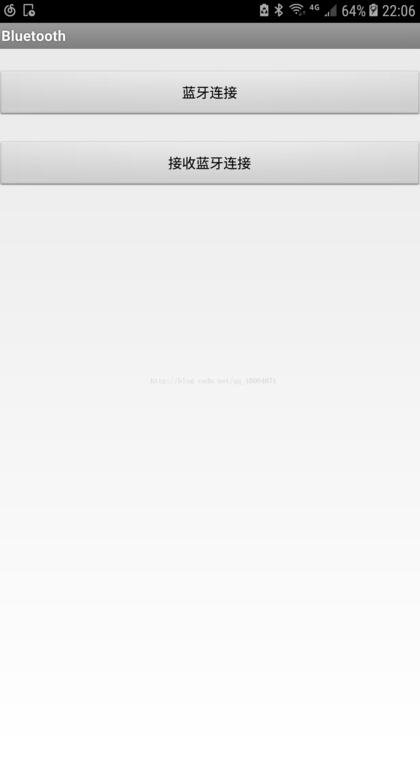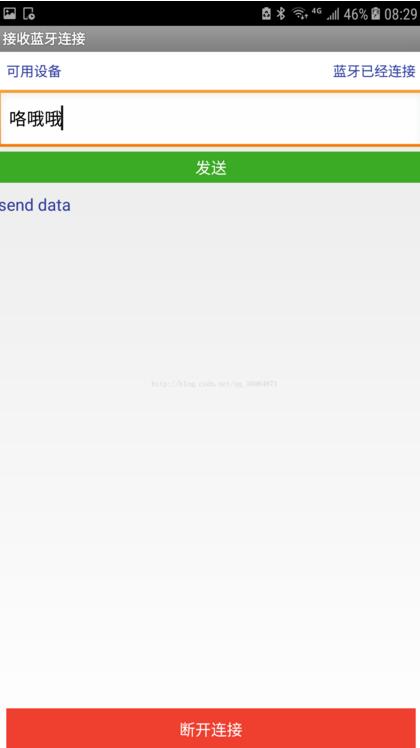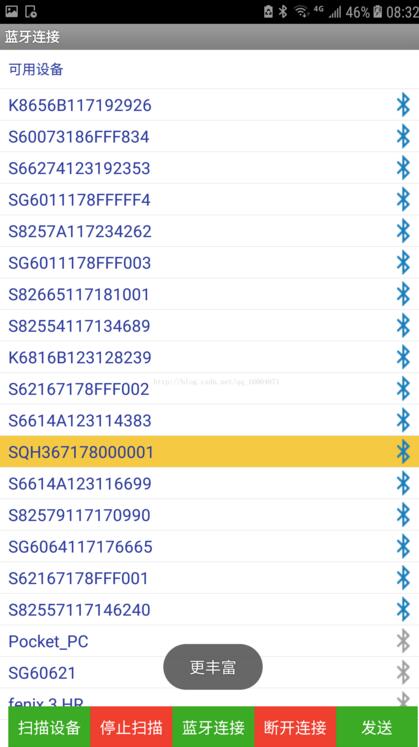android实现主动连接和被动连接的蓝牙聊天功能
发布时间:2020-09-13 21:11:37
来源:脚本之家
阅读:151
作者:mmsx
在项目中经常用到蓝牙的应用,在这里特意写了一个demo。并且封装了代码,可以主动连接和被动连接一起使用,也可以分开使用。方便后面以后查询使用,也重新踩了部分坑。
项目地址:android实现蓝牙聊天功能
1、程序简单的界面



2、客户端,主动连接
package com.bluetooth.tool;
import android.bluetooth.BluetoothAdapter;
import android.bluetooth.BluetoothDevice;
import android.bluetooth.BluetoothSocket;
import java.io.IOException;
import java.io.InputStream;
import java.io.OutputStream;
import java.util.UUID;
//蓝牙连接管理类
public class BluetoothManage {
private static final Object mLock = new Object();
//蓝牙类的具体实现核心成员
private BluetoothAdapter mBtAdapter = BluetoothAdapter.getDefaultAdapter();
//蓝牙类的具体数据核心成员
private BluetoothSocket mTransferSocket = null;
//当前连接的蓝牙地址
String mstrName = "";//当前连接用到的IP地址
String mstrAddress = "";//当前连接用到的IP地址
//读线程
ReadThread mReadThread = null;
//从数据核心成员拿到的输入输出
InputStream mInputStream = null;
OutputStream mOutputStream = null;
private static BluetoothManage manage = null;
public static BluetoothManage getInstance(){
synchronized (BluetoothManage.class){
if(manage == null)
manage = new BluetoothManage();
}
return manage;
}
public boolean sendData(int nLength, byte[] data) {
if (mOutputStream == null) return false;
try {
mOutputStream.write(data, 0, nLength);
return true;
} catch (IOException e) {
e.printStackTrace();
}
return false;
}
ConnectListener mConnectListener = null;
public void regConnectListener(ConnectListener arg0) {
mConnectListener = arg0;
}
TopDataIOListener mIOListener = null;
public void regIOListener(TopDataIOListener arg0) {
mIOListener = arg0;
}
public void unRegIOListener() {
mIOListener = null;
}
public boolean setSelectedDevice(String strDevice) {
String[] strings = strDevice.split("\\|");
if (strings.length == 2) {
mstrName = strings[0];
mstrAddress = strings[1];
return true;
}
return false;
}
public String getSelectedDeviceName() {
if (mstrAddress.length() == 0) {
return null;
}
return String.format("%s|%s", mstrName, mstrAddress);
}
public void connect() {
if (mstrAddress.length() == 0) return;
final BluetoothDevice device = mBtAdapter.getRemoteDevice(mstrAddress);
new Thread(new Runnable() {
@Override
public void run() {
synchronized (mLock) {
String strLogString = "";
try {
try {
mTransferSocket = device.createRfcommSocketToServiceRecord(UUID.fromString("00001101-0000-1000-8000-00805F9B34FB"));
} catch (IOException e1) {
mTransferSocket = null;
}
if (mTransferSocket == null) {
if (null != mConnectListener)
mConnectListener.OnConnectStatusCallBack(false);
return;
}
long nStartMillTime = System.currentTimeMillis();
//连接
try {
mTransferSocket.connect();
} catch (IOException e1) {
try {
mTransferSocket.close();
} catch (IOException e2) {
e2.printStackTrace();
}
//等待一定时间
mTransferSocket = null;
try {
long havePassTime = System.currentTimeMillis() - nStartMillTime;
if (havePassTime < 6000) {
Thread.sleep(7000 - havePassTime);
}
} catch (InterruptedException e) {
e.printStackTrace();
}
}
//连接失败
if (mTransferSocket == null) {
if (null != mConnectListener)
mConnectListener.OnConnectStatusCallBack(false);
return;
}
try {
mInputStream = mTransferSocket.getInputStream();
mOutputStream = mTransferSocket.getOutputStream();
mReadThread = new ReadThread();
mReadThread.start();
if (null != mConnectListener)
mConnectListener.OnConnectStatusCallBack(true);
} catch (IOException e1) {
//断开连接
try {
if (mTransferSocket != null)
mTransferSocket.close();
} catch (IOException e2) {
e2.printStackTrace();
}
mTransferSocket = null;
e1.printStackTrace();
if (null != mConnectListener)
mConnectListener.OnConnectStatusCallBack(false);
}
} catch (Exception e) {
//总体异常
if (null != mConnectListener)
mConnectListener.OnConnectStatusCallBack(false);
}
}
}//run()
}).start();
}
//读取数据
class ReadThread extends Thread {
public void run() {
int nMaxBufLength = 1024;
byte[] buffer = new byte[nMaxBufLength];
int byteRead = -1;
synchronized (mLock) {
while (!isInterrupted()) {
try {
if (mInputStream != null) {
byteRead = mInputStream.read(buffer);
if (byteRead > 0 && byteRead <= buffer.length) {
if (mIOListener != null)
mIOListener.OnIOCallBack(byteRead, buffer);
} else /*if (byteRead < 0 || byteRead > buffer.length)*/ {
//连接已断开
if (mConnectListener != null) {
mConnectListener.OnDisConnectCallBack();
}
break;
}
} else {
break;
}
} catch (IOException e) {
//连接已断开
if (mConnectListener != null) {
mConnectListener.OnDisConnectCallBack();
}
break;
}
}//while(!isInterrupted())
}//synchronized (mLock)
}
}
//断开蓝牙
public void disConnect() {
mConnectListener = null;
//结束读线程
if (mReadThread != null) {
mReadThread.interrupt();
mReadThread = null;
}
//取消所有连接
if (mTransferSocket != null) {
try {
mTransferSocket.close();
if (mInputStream != null)
mInputStream.close();
if (mOutputStream != null)
mOutputStream.close();
mInputStream = null;
mOutputStream = null;
mTransferSocket = null;
} catch (IOException e) {
e.printStackTrace();
} catch (Exception e) {
}
}
}
}
主动连接应该是比较简单的,一个类就能实现,包括数据的收发。
3、蓝牙服务端,接收蓝牙连接
/**
* Copyright (C) 2009 The Android Open Source Project
*
* Licensed under the Apache License, Version 2.0 (the "License");
* you may not use this file except in compliance with the License.
* You may obtain a copy of the License at
*
* http://www.apache.org/licenses/LICENSE-2.0
*
* Unless required by applicable law or agreed to in writing, software
* distributed under the License is distributed on an "AS IS" BASIS,
* WITHOUT WARRANTIES OR CONDITIONS OF ANY KIND, either express or implied.
* See the License for the specific language governing permissions and
* limitations under the License.
*/
package com.bluetooth.tool;
import android.bluetooth.BluetoothAdapter;
import android.bluetooth.BluetoothDevice;
import android.bluetooth.BluetoothServerSocket;
import android.bluetooth.BluetoothSocket;
import android.content.Context;
import android.os.Bundle;
import android.os.Handler;
import android.os.Message;
import android.util.Log;
import java.io.IOException;
import java.io.InputStream;
import java.io.OutputStream;
import java.util.UUID;
/**
* This class does all the work for setting up and managing Bluetooth
* connections with other devices. It has a thread that listens for incoming
* connections, a thread for connecting with a device, and a thread for
* performing data transmissions when connected.
*/
public class BluetoothChatService {
// Debugging
private static final String TAG = "BluetoothChatService";
private static final boolean D = true;
// Name for the SDP record when creating server socket
private static final String NAME = "BluetoothChat";
// Unique UUID for this application
// private static final UUID MY_UUID =
// UUID.fromString("fa87c0d0-afac-11de-8a39-0800200c9a66");
private static final UUID MY_UUID = UUID
.fromString("00001101-0000-1000-8000-00805F9B34FB");
//
// Member fields
private final BluetoothAdapter mAdapter;
private final Handler mHandler;
private AcceptThread mAcceptThread;
private ConnectThread mConnectThread;
private ConnectedThread mConnectedThread;
private int mState;
private BluetoothDevice mBluetoothDevice = null;
// Constants that indicate the current connection state
public static final int STATE_NONE = 0; // we're doing nothing
public static final int STATE_LISTEN = 1; // now listening for incoming
// connections
public static final int STATE_CONNECTING = 2; // now initiating an outgoing
// connection
public static final int STATE_CONNECTED = 3; // now connected to a remote
// device
public static boolean mbIsOpenTimer = false;
/**
* Constructor. Prepares a new BluetoothChat session.
*
* @param context
* The UI Activity Context
* @param handler
* A Handler to send messages back to the UI Activity
*/
public BluetoothChatService(Context context, Handler handler) {
mAdapter = BluetoothAdapter.getDefaultAdapter();
mState = STATE_NONE;
mHandler = handler;
}
/**
* Set the current state of the chat connection
*
* @param state
* An integer defining the current connection state
*/
private synchronized void setState(int state) {
if (D)
Log.d(TAG, "setState() " + mState + " -> " + state);
mState = state;
// Give the new state to the Handler so the UI Activity can update
mHandler.obtainMessage(BluetoothChat.MESSAGE_STATE_CHANGE, state, -1)
.sendToTarget();
}
/**
* Return the current connection state.
*/
public synchronized int getState() {
return mState;
}
/**
* Start the chat service. Specifically start AcceptThread to begin a
* session in listening (server) mode. Called by the Activity onResume()
*/
public synchronized void start() {
if (D)
Log.d(TAG, "start");
// Cancel any thread attempting to make a connection
if (mConnectThread != null) {
mConnectThread.cancel();
mConnectThread = null;
}
// Cancel any thread currently running a connection
if (mConnectedThread != null) {
mConnectedThread.cancel();
mConnectedThread = null;
}
// Start the thread to listen on a BluetoothServerSocket
if (mAcceptThread == null) {
Log.d(TAG, "start mAcceptThread");
mAcceptThread = new AcceptThread();
mAcceptThread.start();
}
setState(STATE_LISTEN);
}
/**
* Start the ConnectThread to initiate a connection to a remote device.
*
* @param device
* The BluetoothDevice to connect
*/
public synchronized void connect(BluetoothDevice device) {
if (D)
Log.d(TAG, "connect to: " + device);
// Cancel any thread attempting to make a connection
if (mState == STATE_CONNECTING) {
if (mConnectThread != null) {
mConnectThread.cancel();
mConnectThread = null;
}
}
// Cancel any thread currently running a connection
if (mConnectedThread != null) {
mConnectedThread.cancel();
mConnectedThread = null;
}
// Start the thread to connect with the given device
mConnectThread = new ConnectThread(device);
mConnectThread.start();
setState(STATE_CONNECTING);
mBluetoothDevice = device;
}
/**
* Start the ConnectedThread to begin managing a Bluetooth connection
*
* @param socket
* The BluetoothSocket on which the connection was made
* @param device
* The BluetoothDevice that has been connected
*/
public synchronized void connected(BluetoothSocket socket,
BluetoothDevice device) {
if (D)
Log.d(TAG, "connected");
// Cancel the thread that completed the connection
if (mConnectThread != null) {
mConnectThread.cancel();
mConnectThread = null;
}
// Cancel any thread currently running a connection
if (mConnectedThread != null) {
mConnectedThread.cancel();
mConnectedThread = null;
}
// Cancel the accept thread because we only want to connect to one
// device
if (mAcceptThread != null) {
mAcceptThread.cancel();
mAcceptThread = null;
}
// Start the thread to manage the connection and perform transmissions
mConnectedThread = new ConnectedThread(socket);
mConnectedThread.start();
// Send the name of the connected device back to the UI Activity
Message msg = mHandler.obtainMessage(BluetoothChat.MESSAGE_DEVICE_NAME);
Bundle bundle = new Bundle();
bundle.putString(BluetoothChat.DEVICE_NAME, device.getName());
msg.setData(bundle);
mHandler.sendMessage(msg);
setState(STATE_CONNECTED);
}
/**
* Stop all threads
*/
public synchronized void stop() {
if (D)
Log.d(TAG, "stop");
if (mConnectThread != null) {
mConnectThread.cancel();
mConnectThread = null;
}
if (mConnectedThread != null) {
mConnectedThread.cancel();
mConnectedThread = null;
}
if (mAcceptThread != null) {
mAcceptThread.cancel();
mAcceptThread = null;
}
setState(STATE_NONE);
}
/**
* Write to the ConnectedThread in an unsynchronized manner
*
* @param out
* The bytes to write
* @see ConnectedThread#write(byte[])
*/
public void write(byte[] out) {
// Create temporary object
ConnectedThread r;
// Synchronize a copy of the ConnectedThread
synchronized (this) {
if (mState != STATE_CONNECTED)
return;
r = mConnectedThread;
}
// Perform the write unsynchronized
r.write(out);
}
/**
* Indicate that the connection attempt failed and notify the UI Activity.
*/
private void connectionFailed() {
setState(STATE_LISTEN);
// Send a failure message back to the Activity
Message msg = mHandler.obtainMessage(BluetoothChat.MESSAGE_TOAST);
Bundle bundle = new Bundle();
bundle.putString(BluetoothChat.TOAST, "Unable to connect device");
msg.setData(bundle);
mHandler.sendMessage(msg);
}
/**
* Indicate that the connection was lost and notify the UI Activity.
*/
private void connectionLost() {
setState(STATE_LISTEN);
// Send a failure message back to the Activity
Message msg = mHandler.obtainMessage(BluetoothChat.MESSAGE_TOAST);
Bundle bundle = new Bundle();
bundle.putString(BluetoothChat.TOAST, "Device connection was lost");
msg.setData(bundle);
mHandler.sendMessage(msg);
start();
}
/**
* This thread runs while listening for incoming connections. It behaves
* like a server-side client. It runs until a connection is accepted (or
* until cancelled).
*/
private class AcceptThread extends Thread {
// The local server socket
private final BluetoothServerSocket mmServerSocket;
public AcceptThread() {
BluetoothServerSocket tmp = null;
// Create a new listening server socket
try {
tmp = mAdapter
.listenUsingRfcommWithServiceRecord(NAME, MY_UUID);
} catch (IOException e) {
Log.e(TAG, "listen() failed", e);
}
mmServerSocket = tmp;
}
public void run() {
if (D)
Log.d(TAG, "BEGIN mAcceptThread" + this);
setName("AcceptThread");
BluetoothSocket socket = null;
// Listen to the server socket if we're not connected
while (mState != STATE_CONNECTED) {
try {
// This is a blocking call and will only return on a
// successful connection or an exception
if(mmServerSocket != null)
{
Log.d(TAG, "waitting accept!");
socket = mmServerSocket.accept();
Log.d(TAG, "accpting!");
}
else
{
setState(STATE_NONE);
if (mAcceptThread != null) {
mAcceptThread = null;
}
Log.d(TAG, "mmServerSocket = null!");
break;
}
} catch (IOException e) {
Log.e(TAG, "accept() failed", e);
break;
}
// If a connection was accepted
if (socket != null) {
synchronized (BluetoothChatService.this) {
switch (mState) {
case STATE_LISTEN:
case STATE_CONNECTING:
// Situation normal. Start the connected thread.
connected(socket, socket.getRemoteDevice());
break;
case STATE_NONE:
case STATE_CONNECTED:
// Either not ready or already connected. Terminate
// new socket.
try {
socket.close();
} catch (IOException e) {
Log.e(TAG, "Could not close unwanted socket", e);
}
break;
}
}
}
}
if (D)
Log.i(TAG, "END mAcceptThread");
}
public void cancel() {
if (D)
Log.d(TAG, "cancel " + this);
try {
if(mmServerSocket != null)
mmServerSocket.close();
} catch (IOException e) {
Log.e(TAG, "close() of server failed", e);
}
}
}
/**
* This thread runs while attempting to make an outgoing connection with a
* device. It runs straight through; the connection either succeeds or
* fails.
*/
private class ConnectThread extends Thread {
private final BluetoothSocket mmSocket;
private final BluetoothDevice mmDevice;
public ConnectThread(BluetoothDevice device) {
mmDevice = device;
BluetoothSocket tmp = null;
// Get a BluetoothSocket for a connection with the
// given BluetoothDevice
try {
tmp = device.createRfcommSocketToServiceRecord(MY_UUID);
} catch (IOException e) {
Log.e(TAG, "create() failed", e);
}
mmSocket = tmp;
}
public void run() {
Log.i(TAG, "BEGIN mConnectThread");
setName("ConnectThread");
// Always cancel discovery because it will slow down a connection
mAdapter.cancelDiscovery();
// Make a connection to the BluetoothSocket
try {
// This is a blocking call and will only return on a
// successful connection or an exception
mmSocket.connect();
} catch (IOException e) {
connectionFailed();
// Close the socket
try {
mmSocket.close();
} catch (IOException e2) {
Log.e(TAG,
"unable to close() socket during connection failure",
e2);
}
// Start the service over to restart listening mode
BluetoothChatService.this.start();
return;
}
// Reset the ConnectThread because we're done
synchronized (BluetoothChatService.this) {
mConnectThread = null;
}
// Start the connected thread
connected(mmSocket, mmDevice);
}
public void cancel() {
try {
mmSocket.close();
} catch (IOException e) {
Log.e(TAG, "close() of connect socket failed", e);
}
}
}
/**
* This thread runs during a connection with a remote device. It handles all
* incoming and outgoing transmissions.
*/
private class ConnectedThread extends Thread {
private final BluetoothSocket mmSocket;
private final InputStream mmInStream;
private final OutputStream mmOutStream;
public ConnectedThread(BluetoothSocket socket) {
Log.d(TAG, "create ConnectedThread");
mmSocket = socket;
InputStream tmpIn = null;
OutputStream tmpOut = null;
try {
tmpIn = socket.getInputStream();
tmpOut = socket.getOutputStream();
} catch (IOException e) {
Log.e(TAG, "temp sockets not created", e);
}
mmInStream = tmpIn;
mmOutStream = tmpOut;
}
public void run() {
Log.i(TAG, "BEGIN mConnectedThread");
byte[] buffer = new byte[1024];
int bytes;
// Keep listening to the InputStream while connected
while (true) {
try {
// Read from the InputStream
if(mmInStream != null ){
bytes = mmInStream.read(buffer);
if(bytes > 0 && bytes <= buffer.length)
{
onDadaReceive(buffer,0,bytes);
}
else{
Log.i("recieve", "Baddata");
}
}
else{
Log.i(TAG, "BadInputStream");
connectionLost();
break;
}
}
catch (IOException e) {
Log.i(TAG, "disconnected" + e.toString(), e);
connectionLost();
break;
} catch (Exception e) {
e.printStackTrace();
}
}
}
private void onDadaReceive(byte[] buffer, int i, int bytes) {
if(bytes>0)
{
//֪ͨܘַ
mHandler.obtainMessage(BluetoothChat.MESSAGE_READ, bytes,
-1, buffer).sendToTarget();
}
else
Log.e("recieve","null");
}
/**
* Write to the connected OutStream.
*
* @param buffer
* The bytes to write
*/
public void write(byte[] buffer) {
try {
mmOutStream.write(buffer);
// Share the sent message back to the UI Activity
mHandler.obtainMessage(BluetoothChat.MESSAGE_WRITE, -1, -1,
buffer).sendToTarget();
} catch (IOException e) {
Log.e(TAG, "Exception during write", e);
}
}
public void cancel() {
try {
mmSocket.close();
} catch (IOException e) {
Log.e(TAG, "close() of connect socket failed", e);
}
}
}
}
这个蓝牙服务的代码,是标准蓝牙示例demo代码
我根据上面,自已封装了一层,方便管理数据。
package com.bluetooth.tool;
import android.content.Context;
import android.os.Handler;
import android.os.Message;
import android.util.Log;
/**
* 蓝牙服务,接收蓝牙连接
*/
public class BluetoothChat {
// Debugging
private static final String TAG = "BluetoothChat";
private static final boolean D = true;
public static final int MESSAGE_STATE_CHANGE = 1;
public static final int MESSAGE_READ = 2;
public static final int MESSAGE_WRITE = 3;
public static final int MESSAGE_DEVICE_NAME = 4;
public static final int MESSAGE_TOAST = 5;
// Key names received from the BluetoothChatService Handler
public static final String DEVICE_NAME = "device_name";
public static final String TOAST = "toast";
private String mConnectedDeviceName = null;
private static StringBuffer mOutStringBuffer;
private static BluetoothChatService mChatService = null;
private static Context mContext;
private volatile static BluetoothChat mBluetoothChat = null;
TopDataIOListener mIOListener = null;
public static BluetoothChat GetInstance(Context context) {
if (mBluetoothChat == null && mContext == null) {
synchronized (BluetoothChat.class){
mBluetoothChat = new BluetoothChat();
mContext = context;
}
}
return mBluetoothChat;
}
public void onStart() {
if (mChatService == null)
setupChat();
if (mChatService != null) {
if (mChatService.getState() == BluetoothChatService.STATE_NONE) {
mChatService.start();
}
}
}
private void setupChat() {
mChatService = new BluetoothChatService(mContext,mHandler);
mOutStringBuffer = new StringBuffer("");
}
public void onDestroy() {
if (mChatService != null)
mChatService.stop();
}
public void sendMessage(String message) {
if (mChatService.getState() != BluetoothChatService.STATE_CONNECTED) {
Log.i("Show", "");
return;
}
if (message.length() > 0) {
byte[] send = message.getBytes();
mChatService.write(send);
mOutStringBuffer.setLength(0);
}
}
private final Handler mHandler = new Handler() {
@Override
public void handleMessage(Message msg) {
switch (msg.what) {
case MESSAGE_STATE_CHANGE:
if (D)
Log.i(TAG, "MESSAGE_STATE_CHANGE: " + msg.arg1);
switch (msg.arg1) {
case BluetoothChatService.STATE_CONNECTED:
break;
case BluetoothChatService.STATE_CONNECTING:
break;
case BluetoothChatService.STATE_LISTEN:
break;
case BluetoothChatService.STATE_NONE:
break;
}
break;
case MESSAGE_WRITE:
byte[] writeBuf = (byte[]) msg.obj;
String writeMessage = new String(writeBuf);
break;
case MESSAGE_READ:
byte[] readBuf = (byte[]) msg.obj;
//收到的蓝牙数据,回传给界面显示
if (mIOListener != null)
mIOListener.OnIOCallBack(readBuf.length, readBuf);
break;
case MESSAGE_DEVICE_NAME:
mConnectedDeviceName = msg.getData().getString(DEVICE_NAME);
Log.i(TAG, "MESSAGE_DEVICE_NAME " + mConnectedDeviceName);
break;
case MESSAGE_TOAST:
break;
}
}
};
public void regIOListener(TopDataIOListener arg0) {
mIOListener = arg0;
}
}
还有一个蓝牙的广播。这里就不贴代码了。
4、权限
蓝牙服务接收广播注册
5、在上面注释看到了有个bug注释
就是部分手机6.0以上 蓝牙蓝牙startDiscovery方法需要加上这个权限android.permission.ACCESS_COARSE_LOCATION。不然启动搜索蓝牙无效。





















 2841
2841











 被折叠的 条评论
为什么被折叠?
被折叠的 条评论
为什么被折叠?








